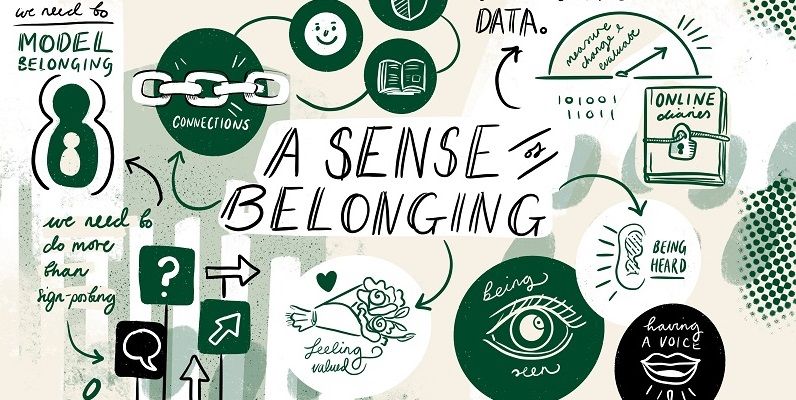What do you mean by belonging?

Exploring varied perspectives of what it means to belong in higher education.
Professor Bridgette Bewick, Professor Liz Thomas and David Gilani consider student and staff understanding of what it means to authentically belong within higher education. They argue that we must value diverse perspectives and experiences if we are to sustainably integrate sense of belonging into curriculum development and educational practices.
What does it mean to feel an authentic sense of belonging in higher education? When staff and students are asked this question, several themes emerge:
Being seen, being valued, and feeling like we matter
- “ … it’s the personal touch… contacting people individually and asking how they are.” (University of Leeds student, 2021)
- “[I feel like I belong] when I have felt my input and suggestions … have been welcomed and taken on board.” (University of Leeds staff, 2020)
- “Taking time to introduce our students to senior members of staff - e.g. our Head of Department - makes sure that students feel ‘worth it’. They still remember that initial meeting.” (Middlesex University staff, 2022)
Belonging is different for everybody
So is ‘belonging’ the same shared experience for all students and staff? We don’t think so. Belonging is relational and requires building of connections between people, place and time. For some, their sense of belonging centres on shared experiences in the moment, for others it is about developing a future identity.
- “[I feel I belong when] our lecturers remember our names and who we are, and greet us in the corridor. They are genuinely interested in what we are getting up to and what our future plans are.” ( University of Leeds student, 2020)
- “Our kitchen is where we have spent most of our time getting to know each other and socialising. This makes us feel like we belong.” (Student, #Ibelong project)
- “I feel like I belong as this is the Faculty of Education where I will study to become a primary school teacher!”(Student, #Ibelong project)
Given this variation, how can we facilitate sense of belonging across large populations of students? How might we make sure every student has opportunities to build connections? To do this sustainably we need to transform how we ‘do’ higher education. Consideration of belonging can no longer be an added extra. We must integrate consideration of belonging into curriculum design and educational practices; systematically critiquing student education through a lens of compassion and belonging.
Facilitating belonging requires questioning of assumptions and a curious mind. There is no one action that will magically make it so students and staff feel they belong in higher education. We need to understand the needs of our students and uncover where unspoken ‘rules’ of the higher education game are hindering student success.
“Belonging work begins by asking, ‘what do we know about our students’? Previous learning, challenges, skills and strengths? What do they need from us?” (Middlesex University staff, 2022)
Even small actions can make a difference
If this sounds overwhelming, please do not underestimate the difference you can make. The accumulation of seemingly small actions have the potential to facilitate an authentic sense of belonging. We don’t all have to do everything, but we do all need to do something.
- “[I feel I belong] during some tutorial … when I get a chance to express my thoughts freely without being judged.” (University of Leeds student, 2019)
- “ [I feel I belong] when there is a really good clinician on placement that makes me feel very involved as a student, and helping rather than hindering…” (University of Leeds student, 2020)
- “It’s so important to emphasise the accessibility of academics - always responsive - always here to help.” (Middlesex University staff, 2022)
Designing in belonging and inclusion will result in meaningful activities that provide students with varied opportunities to build connections. Creating opportunities for students to experience ‘moments of belonging’. Together we can deliver a more equitable and fairer student experience. We can transform higher education into a place where all students feel they belong and where they know they have equitable opportunities for success.
Acknowledgements: quotes are taken from projects conducted at the University of Leeds; the #Ibelong project - involving university partners in the UK, the Netherlands, Germany and Portugal; and research at Middlesex University. We thank all students and staff who shared their perspectives and experiences.